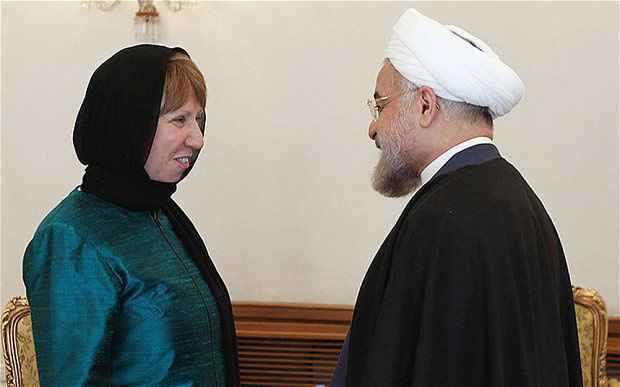In pursuit of a peaceful, WMD-free Middle East

The EU foreign minister Catherine Ashton (left) meets with Hass an Rouhani (right) on nuclear issues. Photo Credit: the Telegraph.uk.
By Julian Weiss, Columnist
One of the most essential interests in American national security is the successful implementation of the Treaty on the Non-Proliferation of Nuclear Weapons (NPT). In the Middle East this has proven historically to be a struggle. Pakistan and Israel are two of only four non-signatories of the NPT. Both have nuclear weapons.
Iran’s domestic nuclear capabilities have provoked GCC states to invest in nuclear research. Although Syria is currently disarming its chemical capability, another chemical attack was reported last week near Damascus.The fiasco caused by disarming Iraq’s nonexistent nuclear capabilities was likely the worst investment ever made by the United States.
The growing number of failed states in a region with high numbers of WMDs puts American interests and allies at risk.
There was a planned conference in 2012 between all Middle Eastern nations and interested host countries on the creation of a Middle Eastern Weapons of Mass Destruction Free Zone (MEWMDFZ). You may have never heard of it because temporary conflicts in the region in addition to numerous difficulties already associated with the project made the conference unachievable.
In order to continue on the path toward the implementation of the NPT in the Middle East, the United States needs to refocus some energy towards a similar conference. The immediate goal would not be so much to disarm nations like Israel and Pakistan, at least not in the foreseeable future, but to create a dialogue which would dissuade nations like Saudi Arabia and Iran from creating their own nuclear arsenal.
With such a dialogue in place, the framework could be laid for discussions to begin disarming the region’s WMD programs.
There are severe consequences associated with the failure to prevent GCC states and Iran from creating nuclear weapons. Israel would be existentially threatened by any nuclear Arab state or Iran. In response Israel would increase its already disturbing military relationship with its neighbors and further develop its nuclear program.
Discussions with Iran on disarming their nuclear weapons program have been positive and promising, but their failure could lead to an arms race between Iran and the Gulf states concluding with their mutual use of nuclear deterrents. With Yemen, Syria, Iraq, and Afghanistan on their way to becoming failed states and thus easier terrorist bases, such a development would be catastrophic to security.
The unique circumstances behind the Iranian nuclear and Syrian chemical disarmament negotiations are promising. If Iran and Syria can negotiate with the United States, perhaps Iran can with Israel and Saudi Arabia with Syria. Even if that is too optimistic, it is at least still feasible for these nations to sit down even at this time of crisis and transformation.
The only way to progress toward the goal of creating a MEWMDFZ is to create dialogue in the Middle East. Failure to do this will not only disrupt current stability but also make it more difficult to create a long term strategy ensuring security in the future.
